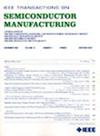基于深度学习的半导体工厂自动化物料处理系统吞吐量多水平预测
IF 2.3
3区 工程技术
Q2 ENGINEERING, ELECTRICAL & ELECTRONIC
引用次数: 0
摘要
自动化物料搬运系统(AMHS)的目标是在半导体晶圆厂中,在正确的时间将晶圆供应到正确的位置。为了实现这一目标,应对不断变化的生产环境的适当管理是必要的,基于这种管理的最佳物料处理的实施可以实现最大的产量和增加的经营利润。通过对生产系统状态的监控,可以维持一个最佳的物料搬运环境,如果系统状态可以提前预测,则会更加有效。本研究提出了一种基于深度学习(DL)的框架在AMHS多水平吞吐量预测中的应用和发展的可能性。为此,我们通过异常检测模型对数据中存在的异常进行插值,从而获得可以提高预测性能的训练数据。与统计方法相比,使用经过改进的数据训练的深度学习模型的表现更好,并且通过时间序列交叉验证进一步证实了稳健的预测性能。这项研究很重要,因为它提出了一种预测方法,可以通过提取影响预测的主要因素以及高性能来先发制人地响应半导体工厂生产环境的变化。本文章由计算机程序翻译,如有差异,请以英文原文为准。
Deep Learning-Based Multi-Horizon Forecasting for Automated Material Handling System Throughput in Semiconductor Fab
Automated material handling systems (AMHS) aim to supply wafers to the right place at the right time in semiconductor fab. Appropriate management in response to the changing production environment is necessary to achieve this goal, and the implementation of optimal material handling based on this management can result in maximum output and increased operating profit. An optimal material handling environment can be maintained by monitoring the production system status and it can be more effective if the system status can be predicted in advance. This study presents the possibility of application and development of a deep learning-based (DL) framework for multi-horizon forecasting of throughput in the AMHS. For this purpose, we acquired the training data that can improve forecasting performance by interpolating anomalies present in the data through an anomaly detection model. The application of a DL model trained with the refined data resulted in outperformance compared to the statistical methods, and robust prediction performance was further confirmed through time series cross-validation. This study is important as it presents a forecasting method that can preemptively respond to the change in the production environments in a semiconductor fab by extracting the major factors that influenced the forecasting along with high performance.
求助全文
通过发布文献求助,成功后即可免费获取论文全文。
去求助
来源期刊

IEEE Transactions on Semiconductor Manufacturing
工程技术-工程:电子与电气
CiteScore
5.20
自引率
11.10%
发文量
101
审稿时长
3.3 months
期刊介绍:
The IEEE Transactions on Semiconductor Manufacturing addresses the challenging problems of manufacturing complex microelectronic components, especially very large scale integrated circuits (VLSI). Manufacturing these products requires precision micropatterning, precise control of materials properties, ultraclean work environments, and complex interactions of chemical, physical, electrical and mechanical processes.
 求助内容:
求助内容: 应助结果提醒方式:
应助结果提醒方式:


